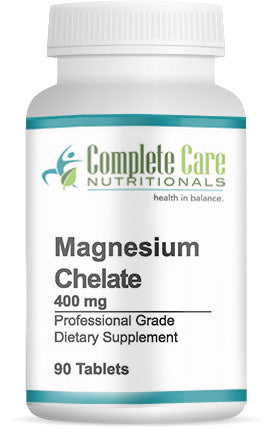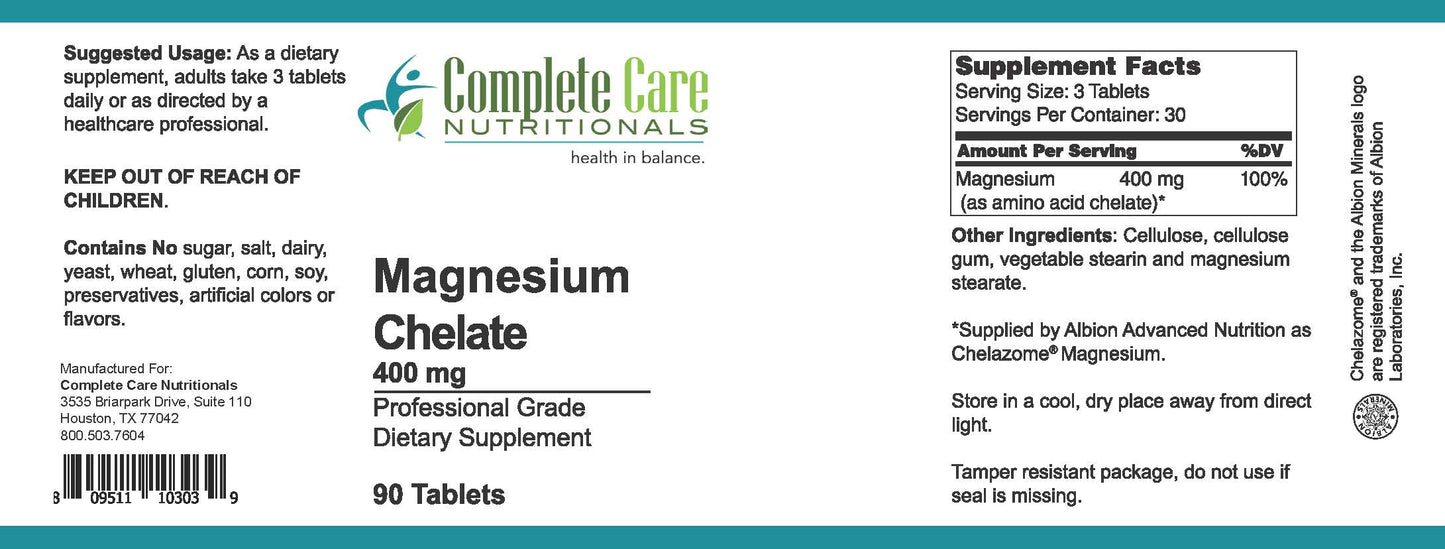Complete Care Nutritional
Magnesium 400 mg
Magnesium 400 mg
Couldn't load pickup availability
Magnesium- Chelate 400 mg
Description
Magnesium Chelate 400 mg is a nutritionally functional magnesium amino acid chelate with excellent bioavailability. Each tablet delivers 133 mg of elemental magnesium as a bis-glycinate/lysinate chelate, or 400 mg per 3 tablet serving.
Functions
Magnesium plays an essential role in a wide range of fundamental cellular reactions. More than 300 enzymes require magnesium as a cofactor. Complexed with ATP, the main carrier of metabolic energy in the body, magnesium is essential for all biosynthetic processes, glycolysis, formation of c-AMP, energy-dependent membrane transport, trans-mission of genetic code for protein synthesis, and muscle function. Of the 20-30 grams of total body magnesium, about 40% is located in muscle and other soft tissues, and the remainder in bone. The concentration of intracellular magnesium is carefully regulated, and its alterations can have profound effects on cardiac and skeletal muscle physiology. Healthy people require about 4.5 mg of dietary magnesium per kg body weight, or 280 mg for a 62 kg female and 350 mg for a 76 kg male. The U.S. RDA is 400 mg/day. The efficiency of magnesium absorption is a function of dietary intake. At very low intakes (less than 40 mg) 65- 70% of dietary magnesium is absorbed, whereas at high intakes (1,000 mg) less than 15% is absorbed. Most people are expected to absorb about 30-60% at common levels of dietary magnesium. Contrary to common belief, recent studies suggest that magnesium absorption is not affected by calcium or vitamin D, and vice-versa. The kidney plays a critical role in magnesium homeostasis. At average magnesium intakes, the kidneys reabsorb about 95% of the filtered magnesium. Our Magnesium is a glycine/lysine chelate that is a well absorbed and highly tolerated form of magnesium.
Indications
Magnesium may be a useful nutritional adjunct for individuals who wish to increase their dietary intake of magnesium
Formula (WW #10303)
3 Tablets Contain:Magnesium (amino acid chelate) ........................ 400 mg Other Ingredients: cellulose, cellulose gum, vegetable stearin, and magnesium stearate. This product contains NO sugar, salt, dairy, yeast, wheat, gluten, corn, soy, preservatives, artificial colors or flavors.
Suggested Use
Adults take 3 tablets daily as a dietary supplement, or as directed by healthcare professional.
Side Effects
No adverse effects have been reported.
Storage
Store in a cool, dry place, away from direct light. Keep out of reach of children.
References
Abbott L, Nadler J, Rude RK. Magnesium deficiency in alcoholism: Possible contribution to osteoporosis and cardiovascular disease in alcoholics. Alcoholism (NY) 1994;18:1076-1082. Adaniya H, Hayami H, Hiraoka M, Sawanobori T. Effects of magnesium on polymorphic ventricular tachycardias induced by aconitine. J Cardiovasc Pharmacol 1994;24:721-729. Al-Ghamdi SMG, Cameron EC, Sutton RAL. Magnesium deficiency: Pathophysiologic and clinical overview. Am J Kidney Dis 1994; 24:737-752. Dahle LO, Berg G, Hammar M, Hurtig M, Larsson L. The effect of oral magnesium substitution on pregnancy-induced leg cramps. Am J Obstet Gynecol 1995;173:175-180. Durlach J, Durlach V, Bac P, Rayssiguier Y, Bara M, Guiet-Bara A. Magnesium and ageing. II. Clinical data: Aetiological mechanisms and pathophysiological consequences of magnesium deficit in the elderly. Magnes Res 1993;6:379-394. Elin RJ. Magnesium: The fifth but forgotten electrolyte. Am J Clin Pathol 1994;102:616- 622. Kisters K, Spieker C, Tepel M, Zidek W. New data about the effects of oral physiological magnesium supplementation on several cardiovascular risk factors (lipids and blood pressure). Magnes Res 1993;6:355-360. Lasserre B, Spoerri M, Moullet V, Theubet M-P. Should magnesium therapy be considered for the treatment of coronary heart disease? II. Epidemiological evidence in outpatients with and without coronary heart disease. Magnes Res 1994;7:145-153. Orlov MV, Brodsky MA, Douban S. A review of magnesium, acute myocardial infarction and arrhythmia. J Am Coll Nutr 1994;13:127-132. Rayssiguier Y, Durlach J, Gueux E, Rock E, Mazur A. Magnesium and ageing. I. Experimental data: Importance of oxidative damage. Magnes Res 1993;6:369-378. Rock E, Astier C, Lab C, et al. Dietary magnesium deficiency in rats enhances free radical production in skeletal muscle. J Nutr 1995;125:1205-1210. Schuette SA, Lashner BA, Janghorbani M. Bioavailability of magnesium diglycinate vs magnesium oxide in patients with ileal resection. J Parenter Enter Nutr 1994;18:430-435. Seelig MS. Consequences of magnesium deficiency on the enhancement of stress reactions; Preventive and therapeutic implications. J Am Coll Nutr 1994;13:429-446. Sojka JE, Weaver CM. Magnesium supplementation and osteoporosis. Nutr Rev 1995;53:71-74. Spencer H, Fuller H, Norris C, Williams D. Effect of magnesium on the intestinal absorption of calcium in man. J Am Coll Nutr 1994;13:485-492. Thomas J, Tomb E, Thomas E, Faure G. Migraine treatment by oral magnesium intake and correction of the irritation of buccofacial and cervical muscles as a side effect of mandibular imbalance. Magnes Res 1994;7:123-127. Wirell MP, Wester PO, Stegmayr BG. Nutritional dose of magnesium in hypertensive patients on beta blockers lowers systolic blood pressure: A double-blind, cross-over study. J Intern Med 1994;236:189-195. Witteman JCM, Grobbee DE, Derkx FHM, Bouillon R, De Bruijn AM, Hofman A. Reduction of blood pressure with oral magnesium supplementation in women with mild to moderate hypertension. Am J Clin Nutr 1994;60:129-135.
Share




